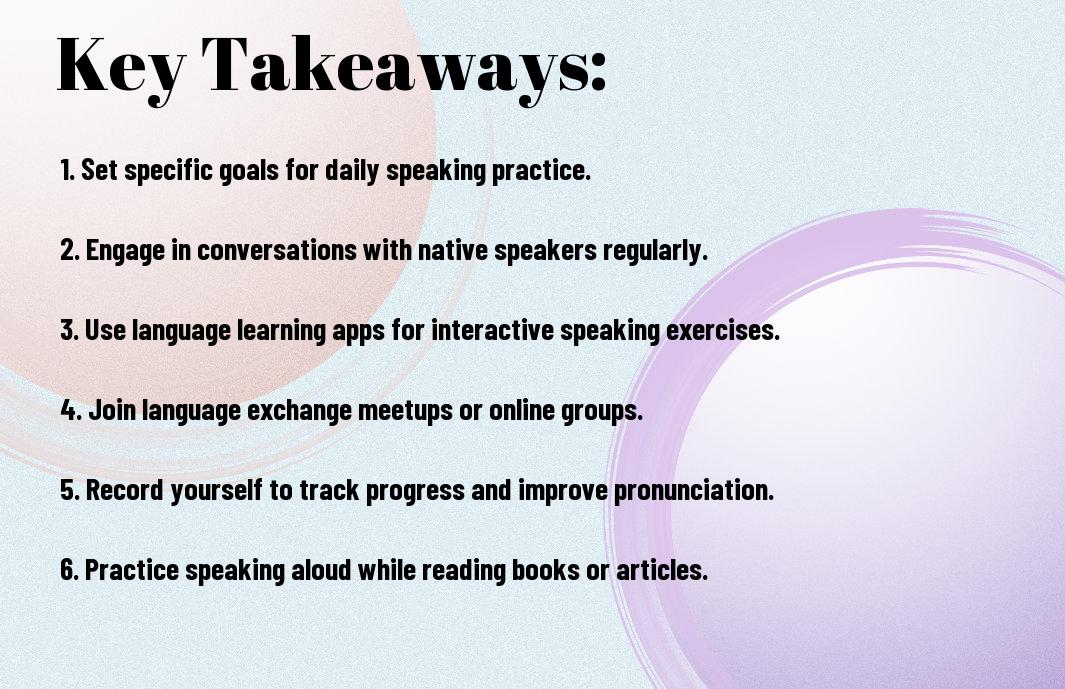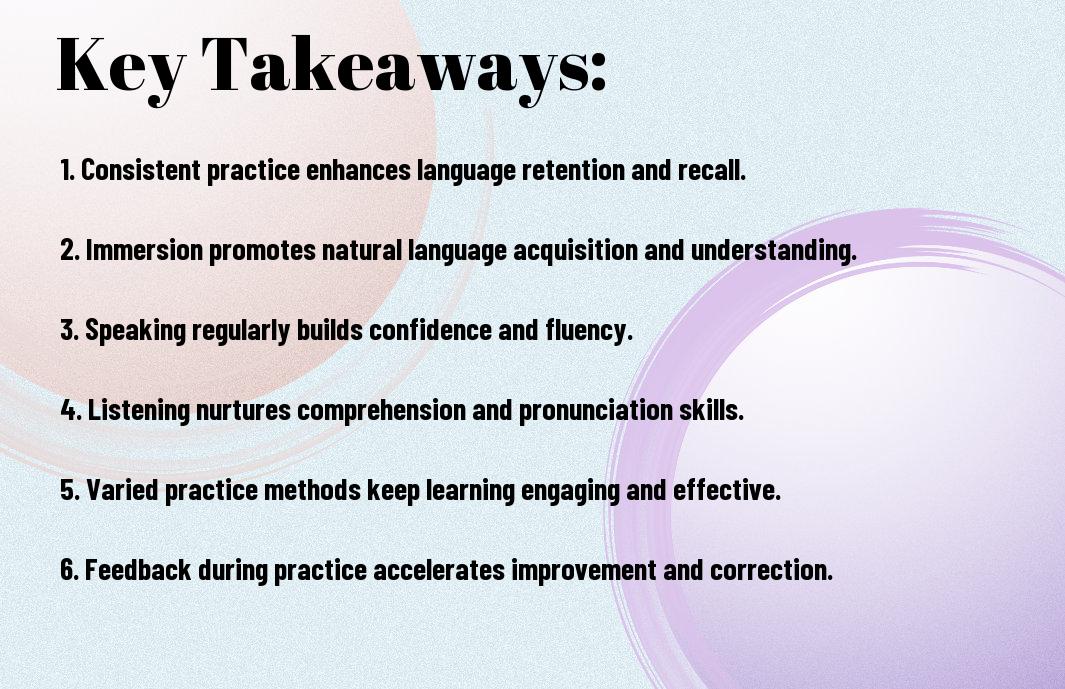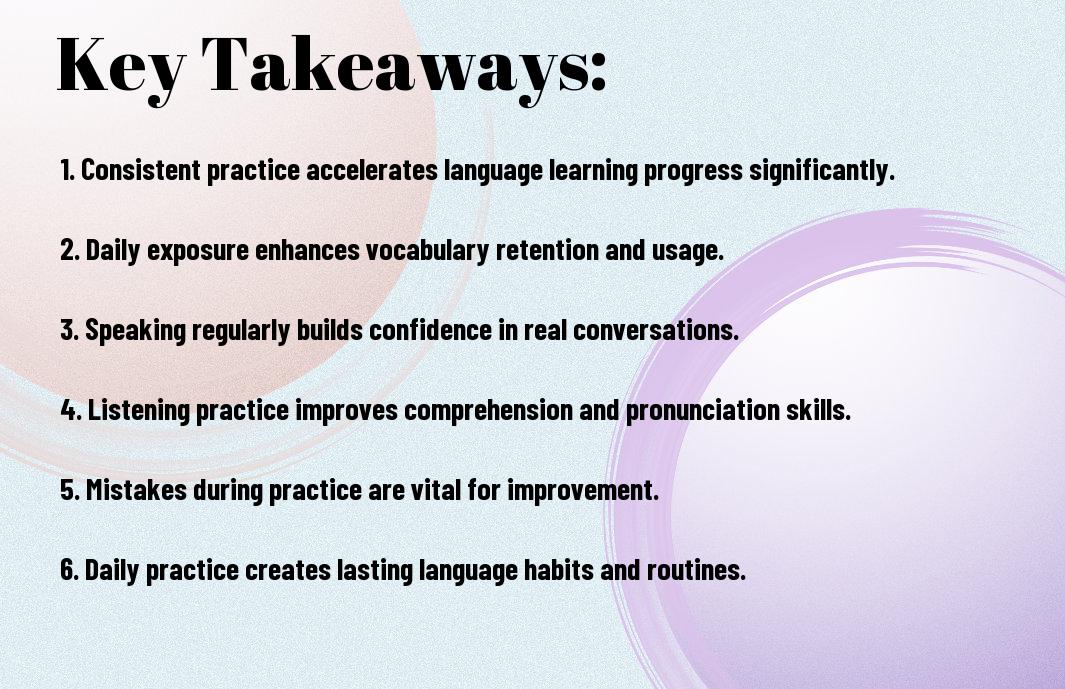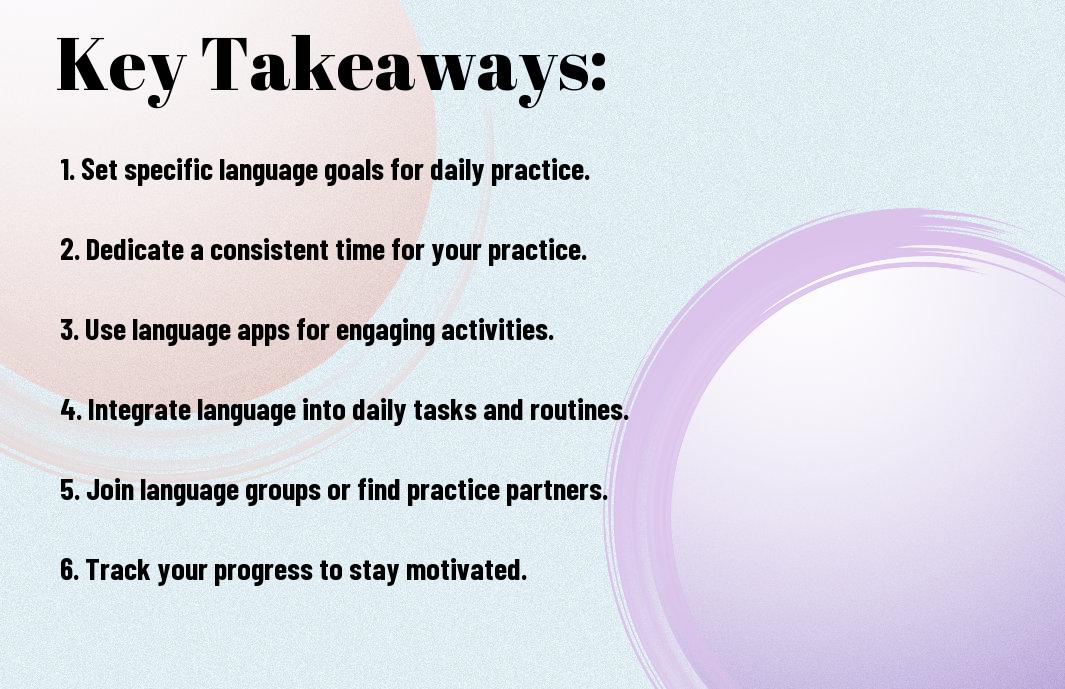As you strive to improve your language skills, you’ll find that pronunciation practice plays a significant role in achieving fluency. Your ability to pronounce words correctly is important to effective communication, and regular practice helps you develop a more natural flow. By focusing on your pronunciation, you’ll enhance your overall language proficiency, enabling you to express yourself more confidently and accurately in your target language.

Key Takeaways:
- Effective pronunciation practice plays a significant role in achieving fluency in a language, as it enables learners to communicate clearly and confidently.
- Regular practice helps to develop muscle memory, allowing learners to focus on the content of their message rather than the individual sounds and intonation patterns.
- Authentic materials, such as videos and podcasts, can be used to provide learners with opportunities to practice listening and speaking in a more engaging and motivating way.
- Focused pronunciation practice can help learners to overcome barriers to communication, such as accents and intonation patterns that may be difficult for native speakers to understand.
- Technology, such as speech recognition software and mobile apps, can provide learners with personalized feedback and targeted practice opportunities to improve their pronunciation and overall fluency.
Importance of Pronunciation
A key aspect of language learning is pronunciation practice, as it enables you to communicate effectively and be understood by others, making it an imperative part of your language development.
Fundamentals of Clear Speech
Between the sounds, rhythm, and pacing of speech, you will find that clear speech is rooted in the consistent practice of pronunciation, allowing you to articulate your thoughts and ideas with precision and clarity.
Role of Intonation and Stress
Alongside the development of your pronunciation skills, you will discover that intonation and stress play a significant role in conveying meaning and context, helping you to express your intentions and attitudes in your speech.
Achieving mastery over intonation and stress patterns will enable you to convey subtle nuances in your speech, allowing you to express yourself with greater precision and authenticity, and you will find that your listeners are more likely to understand your intended meaning, making your communication more effective and engaging.
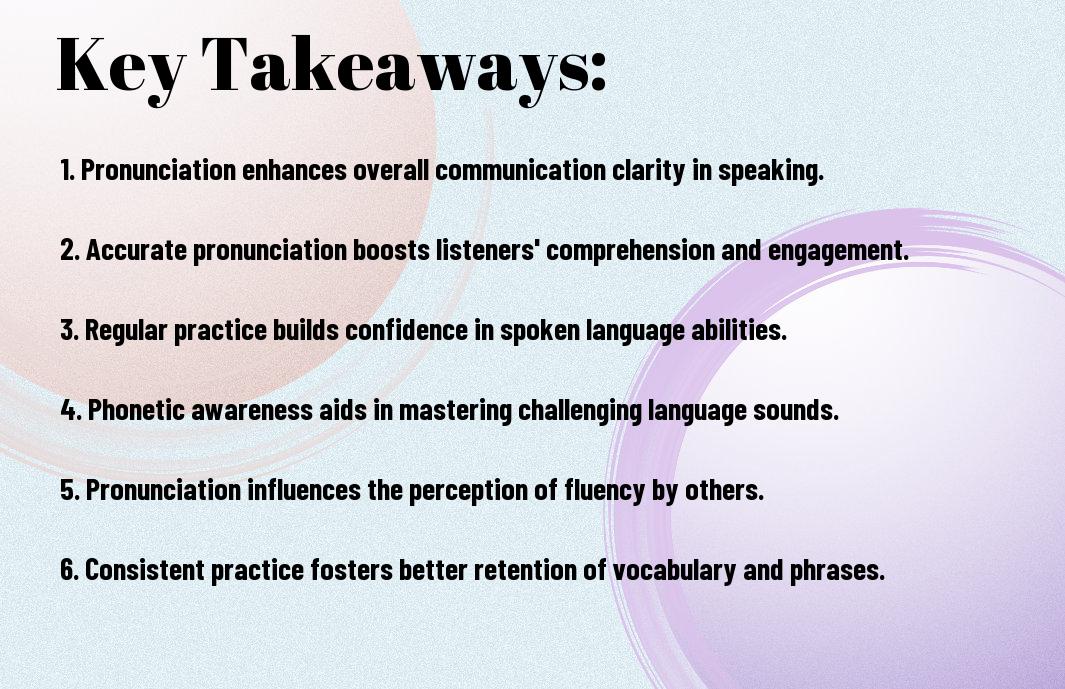
Effective Pronunciation Practice
One of the most effective ways to improve your pronunciation is through regular practice. You can start by practicing individual sounds, then move on to words and sentences. As you practice, you will become more aware of your own pronunciation and be able to make adjustments to improve your speaking skills.
Techniques for Improving Articulation
Any effort you put into practicing pronunciation will help you improve your articulation. You can try speaking in front of a mirror, recording yourself, or practicing with a language exchange partner to identify areas that need improvement. This will help you develop your skills and sound more natural when speaking.
Using Audio and Visual Aids
One of the best ways to improve your pronunciation is by using audio and visual aids. You can use videos, podcasts, and language learning apps to listen to native speakers and practice mimicking their pronunciation. This will help you get used to the sounds and rhythms of the language.
For instance, you can watch TV shows or movies in the target language with subtitles, and then try to repeat the sentences out loud. You can also use apps that provide audio clips and ask you to repeat what you hear, giving you feedback on your pronunciation. By using these tools, you will be able to improve your pronunciation and sound more like a native speaker. As you continue to practice, you will become more confident in your ability to communicate effectively in your target language.
Language Learning and Fluency
For language learners, achieving fluency is a primary goal, and pronunciation practice plays a significant role in this process, as it enables you to communicate effectively and efficiently in your target language.
Connection between Pronunciation and Comprehension
Previously, you may have noticed that improving your pronunciation helps you better understand native speakers, as clear pronunciation facilitates comprehension and enhances your overall language learning experience.
Building Confidence in Speaking
Properly, pronunciation practice helps you build confidence in speaking, allowing you to express yourself more comfortably and accurately in your target language, which in turn enhances your ability to engage in conversations with native speakers.
Hence, as you continue to practice pronunciation, you will find that your confidence in speaking grows, enabling you to participate more freely in discussions and conversations, and your ability to communicate effectively in your target language will significantly improve, allowing you to achieve your language learning goals and become a more proficient speaker.
Common Challenges and Solutions
Now that you’ve started practicing pronunciation, you’ll encounter challenges that can hinder your fluency. You’ll need to address these issues to improve your speaking skills.
Overcoming Accent and Dialect Barriers
With consistent practice, you can overcome accent and dialect barriers that affect your pronunciation. You’ll become more aware of your own speech patterns and learn to adapt to different accents and dialects.
Strategies for Self-Improvement
For effective pronunciation practice, you’ll need to develop strategies that work for you. You can start by recording yourself, listening to native speakers, and mimicking their intonation and rhythm.
Common strategies for self-improvement include setting achievable goals, practicing regularly, and seeking feedback from others. As you work on your pronunciation, you’ll find that your fluency improves, and you’ll become a more confident speaker, able to express yourself more clearly and effectively in your target language. You’ll be able to identify areas that need improvement and make adjustments to your practice routine accordingly.
Technology and Pronunciation Practice
After exploring various methods for improving pronunciation, you can leverage technology to enhance your practice. You can access numerous digital tools and resources to help you develop your speaking skills and achieve fluency.
Online Resources and Tools
Beneath the surface of language learning, you’ll find a wealth of online resources and tools that can aid your pronunciation practice. You can utilize websites, videos, and podcasts to improve your listening and speaking skills.
Mobile Apps for Language Learners
Parallel to traditional learning methods, pronunciation practice can be facilitated through mobile apps designed for language learners. You can use these apps to access interactive exercises, audio recordings, and pronunciation guides tailored to your needs.
In addition, many mobile apps offer features such as speech recognition, recording capabilities, and personalized feedback, allowing you to track your progress and refine your pronunciation skills. You can explore various apps to find the one that best suits your learning style and goals, and incorporate it into your daily practice routine to enhance your fluency.
Teaching Pronunciation in the Classroom
Despite the challenges, you can effectively teach pronunciation in the classroom by incorporating various techniques and resources, such as referring to The Role of Pronunciation in a Foreign Language Program for guidance.
Methods for Instructors and Educators
Pronouncing words correctly is key to effective communication, and as you teach, you will find that using audio and video recordings can help your students improve their pronunciation skills.
Creating a Supportive Learning Environment
Instructively, you should create an environment where your students feel comfortable practicing their pronunciation without fear of judgment, allowing them to build confidence in their language skills.
Methods such as providing feedback, encouraging self-recording, and using pronunciation learning apps can help you create a supportive learning environment, where you can help your students overcome their pronunciation challenges and achieve fluency in the target language, enabling you to tailor your teaching to meet their individual needs.
Summing up
To wrap up, you now understand the significance of pronunciation practice in achieving fluency. As you strive to improve your language skills, you can Learn English pronunciation to develop fluency and enhance your overall communication. By focusing on your pronunciation, you will be able to express yourself more effectively and confidently, taking your language skills to the next level, and achieving your goals.
FAQ
Q: What is the significance of pronunciation practice in achieving fluency in a foreign language?
A: Pronunciation practice plays a vital role in achieving fluency in a foreign language as it enables learners to communicate effectively and confidently. When learners practice pronunciation regularly, they develop the ability to produce words and sentences with accurate intonation, stress, and rhythm, which is important for conveying their intended message. Moreover, good pronunciation helps learners to sound more natural and native-like, making it easier for them to engage in conversations and interact with native speakers.
Q: How can pronunciation practice improve fluency in terms of speaking and listening skills?
A: Pronunciation practice can significantly improve fluency in speaking and listening skills by enhancing a learner’s ability to articulate words and sentences clearly and accurately. When learners practice pronunciation, they develop their ability to produce speech sounds, intonation patterns, and rhythm, which helps them to speak more smoothly and coherently. Additionally, pronunciation practice also improves listening skills, as learners become more attuned to the sounds and rhythms of the language, enabling them to better understand native speakers and follow conversations with greater ease.
Q: What are some effective ways to incorporate pronunciation practice into a language learning routine to enhance fluency?
A: There are several effective ways to incorporate pronunciation practice into a language learning routine to enhance fluency. One approach is to practice speaking and listening regularly, using audio and video materials such as podcasts, videos, and language learning apps. Learners can also practice shadowing, where they repeat what a native speaker is saying, trying to mimic their intonation, stress, and rhythm. Another approach is to engage in conversations with native speakers, either in person or online, to practice speaking and listening in a more interactive and dynamic way. Furthermore, learners can use pronunciation-focused exercises and activities, such as tongue twisters, pronunciation drills, and audio description exercises, to target specific sounds and intonation patterns.

